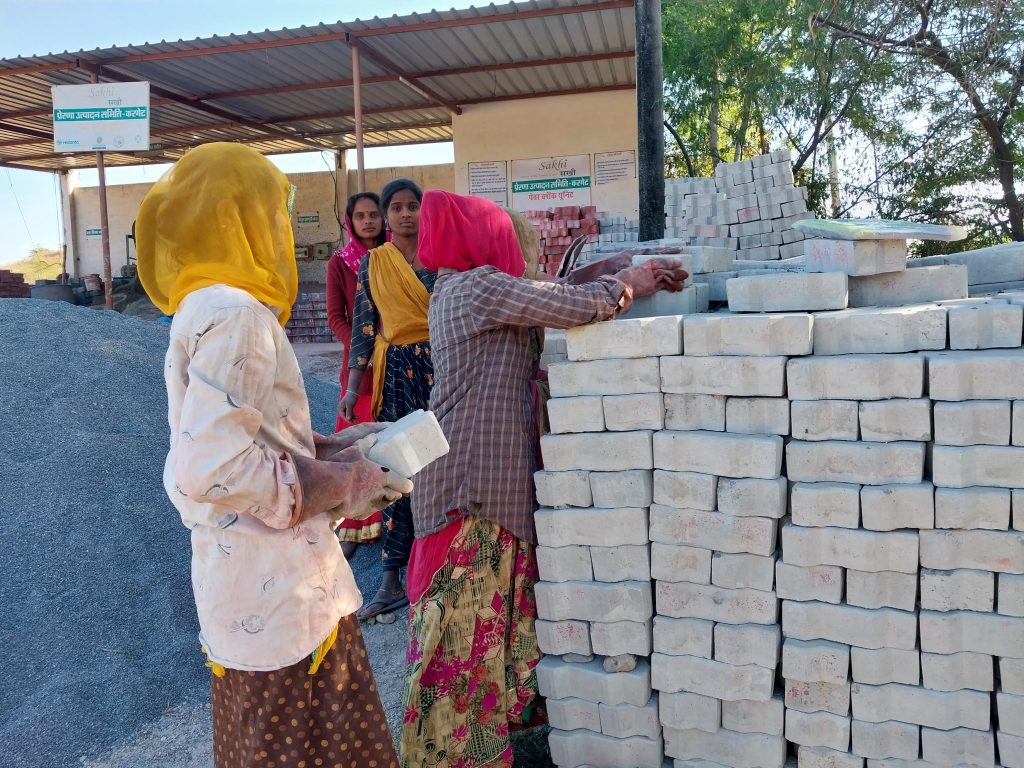A small-scale unit in a tribal village in Udaipur employs women on a rotational basis. This is proving to be a game-changer at a place where traditionally women gather fuelwood, graze goats and work in fields, writes Deepanwita Gita Niyogi
Nathibai Meena, a woman from the tribal community of Rajasthan, earns Rs 200 per day by working a few hours at a small-scale brick manufacturing unit. This has been a game changer in a place where traditionally women gather fuelwood, graze goats and work in fields. But in Karget, a village in Udaipur district dominated by the Gameti tribe, brick making is providing income to women since 2019.
The initiative is part of Sakhi, a corporate social responsibility programme of Hindustan Zinc. Under this, non-profit Manjari Foundation and its partner organisation, Hanuman Van Vikas Samiti are looking after the project.
For setting up the brick unit in Karget registered in the name of Prerna Utpadan Samiti, a micro enterprise, two village organisations became involved from the start. The women work on a rotational basis for about four hours daily. Earlier, they used to make fly ash bricks but after the material got over, unbaked bricks are manufactured for use in floors. In some of the bricks, red colour is added for an attractive look and these are preferred in gardens for border. The bricks have a mixture of cement, sand, gravel and chemical hardener. Whereas the red bricks are priced at Rs 12.50 per piece, the white ones cost Rs 11.50.
The brick manufacturing unit was launched to provide decent livelihood opportunity to women belonging to the Gameti tribe. The bricks are sold to the panchayat as well as private parties.
A women’s enterprise
According to Nathibai, in case of power cut, work suffers but otherwise women come from nearby villages every day. “The brick making unit has been an answer to prayer for widows and women having small children at home. They can work for a few hours and leave. There are some women who also work in the field throughout the day to cultivate wheat and vegetables in case there is adequate water availability. They can also earn money through making bricks. On a daily basis, four women make about 500 bricks.The set of women changes after a fortnight and another group comes to work. This is to ensure that everyone gets a chance,” she said.

Normally bricks are baked in kilns but in Karget, the women make unbaked bricks which are left to dry in the sun. As part of production, these are shaped in rectangular molds, thoroughly dried and then sold off. Normally, the bricks are kept 15-20 days at the site before sale.
Workers Heera Gameti and Sagni Gameti are happy to work here as the initiative has ensured money as well as management for tribal women. Before this, for labour work, MGNREGA was the only option in the village. “Many women used to graze goats in the forest before this. Sometimes if a few women cannot come due to some family responsibility, others take their place,” Nathibaiadded.
As a group of women scooped up gravel and sand with shovels, prepared the mixture and poured it in the concrete mixing machine with water and later managed the colour mixer machine, the hard labour on their part was evident. But the women smiled and carried on. Two women managed the vibrator table before keeping the newly made bricks away.
Going strong
The Prerna Utpadan Samiti is a registered enterprise designed to offer women part-time employment. Till now, this year’s profit stands at an average of Rs 35,000. The women suffered a setback due to the pandemic. Overall, since its launch, the profit earned stands at Rs 45,000-50,000. In 2020-21 it was Rs16,000.
After the bricks are made, these are kept at the site. The total manufactured number of bricks since 2019 has crossed over a lakh. An estimated Rs11 lakh is the total budget for 2022-23 with an aim of expanding the initiative.
Bhurelal Gameti, the father in-law of Leela who is the secretary of Prerna Utpadan Samiti, looks after the entire management. “The plant started in 2019-20. But after a good start it was closed during the pandemic. The women wanted a micro enterprise here. In future, this can earn more profit for them. I am also in charge of procurement of the materials,” he said.
As there were some technical things associated with the initiative, Bhurelal was chosen for overall management. The women who work here get Rs 2 per brick. Leela said before starting work here, the women were taken to Udaipur for a thorough training. After that, work began at the site in Karget village.
India’s female labour participation rate has fallen from 26 percent in 2005 to 20.3 percent in 2019, according to the World Bank. But there has been a rise in the rural female labour force participation rate from 19.7 percent in 2018-19 to 27.7 percent in 2020-21, says the Economic Survey 2022-23.













